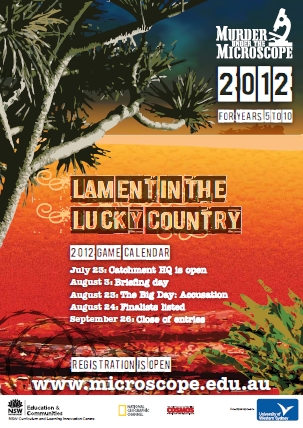Today I visited an elementary school near the University of Wollongong called Keiraville Public School. I had read their Centre for Excellence plan which identifies two priority areas: 1) connected learning focussing on teacher quality and student engagement in the areas of literacy and numeracy, and 2) aboriginal education. Throughout the document there were many specific goals and strategies outlined, some of which I saw in action while I was visiting the school. I will probably blog more about these specific classroom activities later, for now I want to share what I’ve learned about a particular program that is running here in Australia which is particularly good for science learning and teaching. It is called Murder Under the Microscope and it is connected to the WeCreate (formerly Connected Learning Awards) program.
The WeCreate program is run by the Curriculum and Learning Innovation Centre of the New South Wales Department of Education. It is a series of digital challenges for students of a range of ages and subject areas. They all aim to:
- Inspire creativity and innovation in Australian students aged K-12
- Encourage the use of technology in learning
- Celebrate excellence
- Promote quality teaching and learning
The types of challenges are extremely wide ranging. For example Kindergarten students are encouraged to create an eArt or eStory, 7-12 Maths students can create an App, and 7-12 English students can create a BlogEd. There are many more challenges. See this overview for a list of the challenges separated by grade and subject area. Each digital challenge is well outlined with rules and expectations. Closing dates vary and awards are given out at a ceremony in the Sydney Opera House.
One challenge that I found particularly interesting, from a science teaching and learning point of view, is the Murder Under the Microscope challenge. This challenge is an online game where teams of students act as EcoSleuths so solve an environmental crime. Students can participate in the game, and can also participate in the WeCreate competition by using digital media to represent how they were ‘scientific investigators’, ‘creative investigators’ or how they applied what they learned in their community – the ‘MuM Citizenship Award’. There is a wiki to support teachers who want their students to participate in this online game. The wiki provides activities and experiments that students should do to familiarize themselves with content that will come up during the game. It seems like a very engaging activity for students to participate in. In fact, the 2012 game just started last week, and currently the main website where teachers and students log in to get their weekly clues is currently experiencing technical difficulties, likely due to high volume of use! In this video you can see teachers’ and students’ experiences from the 2010 game:
This appears to be an extremely successful program that allows teachers and students to engage at a variety of levels. Students can just play the game and learn valuable lessons about science content, particularly around environmental sustainability. However, if the students want to take their learning a step further they can represent how they participated in the scientific process to solve the mystery and enter their representation into the WeCreate awards. I haven’t found any research or reports that discuss the learning that has resulted from this program yet, but it is exactly the kind of unique science learning social media application that I have been looking for to study in more depth in the future. One thing that is a little unclear to me is the extent to which students/teams from across the country work together to solve the mystery. Do they share findings between teams? Or do they work in isolation, competing against one another? I’d love to hear from teachers who have participated in this program… I’d also like to know whether there is anything similar to this happening in Canada or the United States. Do we have large scale digital challenges? Are any particularly geared towards science?

